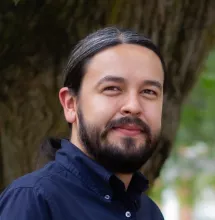
Fall 2025 CosmicAI Seminar Series --Finding Exotic Transients in the Era of Big Data
Abstract: Time domain astronomy, or the study of the dynamic universe on human timescales, stands at the forefront of a revolution fueled by the advent of large surveys. We have recently experienced an unprecedented influx of observations that led to the discovery of exotic transients such as superluminous supernovae or tidal disruption events. The upcoming deployment of next-generation survey telescopes, such as the Vera C. Rubin Observatory and the Nancy Grace Roman Space Telescope, will increase our transient detection capabilities by two orders of magnitude. Developing machine learning techniques will prove to be not only useful, but necessary, to deal with the deluge of data we will obtain from these observatories, promising deeper insights into known cosmic phenomena and the exciting prospect of discovering entirely new classes of transients.
Speaker Bio: Since August 2025, I have been an Assistant Professor of Astronomy at The University of Texas at Austin. Previously, I was a Clay postdoctoral fellow at the Center for Astrophysics | Harvard & Smithsonian and an STScI postdoctoral fellow at the Space Telescope Science Institute, where I split my time working with exotic transients with the Transients Science @ Space Telescope group and the Roman Space Telescope. I graduated with a PhD in Astronomy & Astrophysics in 2021 from Harvard University, where I worked with the Berger Time Domain Group on the discovery and classification of exotic supernovae, particularly on the optical study of superluminous supernovae and tidal disruption events, as well as machine learning techniques to find these objects more efficiently. I am originally from Ciudad Juárez, México. I attended college nearby at The University of Texas at El Paso and finished with a degree in Physics in 2015. While at UTEP I focused on the study of X-ray binaries, especially on the discovery of new galactic black hole X-ray binaries. In my spare time I like to do archery and photography.